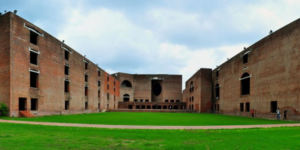Revolution is not a culture of bomb and pistol. Our meaning of revolution is to change the present conditions, which are based on manifest injustice.
– Bhagat Singh
Bhagat Singh was hanged by the British on March 23, in 1931.
In this piece, I want to explain the above quote and locate his ideological evolution as one of our most loved revolutionary thinkers.
As I said, Bhagat Singh is one of our major icons whom we ritually remember on March 23 to commemorate him as martyr and a nationalist. There are only few of his adherents who care to look beyond this limited and incomplete celebration of our hero. He was actually a young ideologue, who perceptively commented on the social, political and economic ills of the society. He just did not wage a revolutionary fight against the colonial oppression but also envisaged a progressive vision for an independent India.
We need to recall this vision even more urgently today when we see him being appropriated by those who blatantly espouse divisive politics based on religious and caste lines. Bhagat Singh wrote incessantly against this hate, besides expressing his concern about the rampant economic inequality.
Let us go back to his first journalistic piece written in 1924, when he was just 17 years old. We hear the buzz about Vasudeva Kutumbakam (‘world is a family’) all around, the G-20 logo is pasted with this motto across Indian cities.
Bhagat Singh wrote on ‘universal brotherhood’ (vishva bandhuta) and began the piece with the same motto but did not stop with a mere lip service. He explained what it actually meant to him. Vishva bandhuta for him meant equality and nothing else. In a world where we look for the ‘other’ amongst our own fellow citizens, Bhagat Singh had this to say:
“All of us being one and none is the other.”
He is even more apt for our contemporary divisive times when he envisaged:
“It will really be a great moment in the world when we will have no strangers…which will be a pinnacle of world progress”.
His Vasudeva Kutumbakam envisaged a persecution free world but he also expressed an apprehension if we are at all ready to make sacrifices to achieve that sort of a world. He wrote:
“We will have to campaign for equality and equity. We will have to punish those who oppose the creation of such a world. We will have to create chaos in place of those states/empires, who, blind with power, are responsible for inflicting pain and suffering on crores of people.
“Are people ready for that?”
All those who are screaming for Vasudeva Kutumbakam or world brotherhood should introspect and see if they are really working towards that goal.
“If not”, wrote Bhagat Singh, “then just give up this hypocrisy today”.
It was true then and it is sadly pertinent today as well. Bhagat Singh did not stop here, as a young man he was critical of all those fellow Indians who were hypocritical, and were not sincere in building an India or a world where all sorts of disparities continue to exist, in his own words:
“As long as the words like black and white, civilised and uncivilised, ruler and the ruled, rich and poor, touchable and untouchable, etc., are in vogue where is the scope for universal brotherhood?”
This early article published in a Hindi magazine Matwala from Calcutta gives us enough clue to the trajectory of his future intellectual evolution, though the span of his active life was too short.
Let me come to a phase of his life when he had just turned twenty-three in the Lahore jail, had spent most of his time in reading and writing, which includes his seminal essay ‘Why I am an Atheist’. However, I will share some of his views from the last letter he wrote addressing the youth of India on February 2, 1931, merely a few days before his martyrdom.
Here he laid down an agenda for the revolutionary struggle, setting out the strategy and objectives of the struggle. He sent out this elaborate appeal despite being aware that he is not going to be around for very long. His optimism to imagine a progressive independent India is palpable all through this letter.
All those who venerate Bhagat Singh today, for his martyrdom and nationalism, should also heed to pay some attention to his last appeal where he bares his heart to proclaim his vision of a future India. While explaining the meaning of ‘Long Live Revolution’, he wrote “revolution means the complete overthrow of the existing social order. For that purpose, our immediate aim is the achievement of power…We want to snatch it, and handle it, to utilise it for the consummation of our ideal, i.e., social reconstruction of a new, i.e., Marxist basis.” This was a new India Bhagat Singh envisaged in 1931, it is not difficult to see how far away we have moved from this ideal of our revolutionary icon.
Even his other detailed journalistic writings in the Kirti as well as the manifesto of Naujawan Bharat Sabha and his court statements depict him as a young man with a passionate commitment to his nation, he was a visionary, with a pluralist and egalitarian perception of independent India. He visualised an India where 98% will rule instead of elite 2%. His azaadi was not limited to the leaving of the British, instead he desired azaadi from poverty, azaadi from untouchability, azaadi from communal strife and azaadi from any other discrimination/exploitation.
Coming back to his last appeal, Bhagat Singh categorically stated that:
“…[T]he struggle in India would continue so long as a handful of exploiters go on exploiting the labour of the common people for their own ends. It matters little whether these exploiters are purely British capitalists, or British and Indians in alliance, or even purely Indians.”
Bhagat Singh did not stop here, he further elaborated that a party of political workers should be prepared, which is “bound by strict discipline…It shall have to organise the peasants and workers parties…the party should organise a big publishing campaign…enlightening the masses of the socialist theory…The writings should be simple and clear.” For me, this is the real Bhagat Singh who left behind a precious intellectual legacy. He was martyred once by the British while we kill him every day by ignoring the idea of India he bequeathed to us.
I will end with a few lines from the introduction he reluctantly wrote for The Dreamland, a book of poetry by a senior Ghadar revolutionary Lala Ram Saran Das. Bhagat Singh wrote:
“Next the author deals with the problem concerning various conflicting religions. He tries to reconcile them just as all nationalists try to do. His method of dealing with the question is lengthy and circuitous, though on my part I would have dismissed it with one line by Karl Marx: ‘Religion is the opiate of the masses’.”
(S. Irfan Habib is an historian and has served as Maulana Azad Chair at the National University of Educational Planning and Administration, New Delhi. Courtesy: The Wire.)




